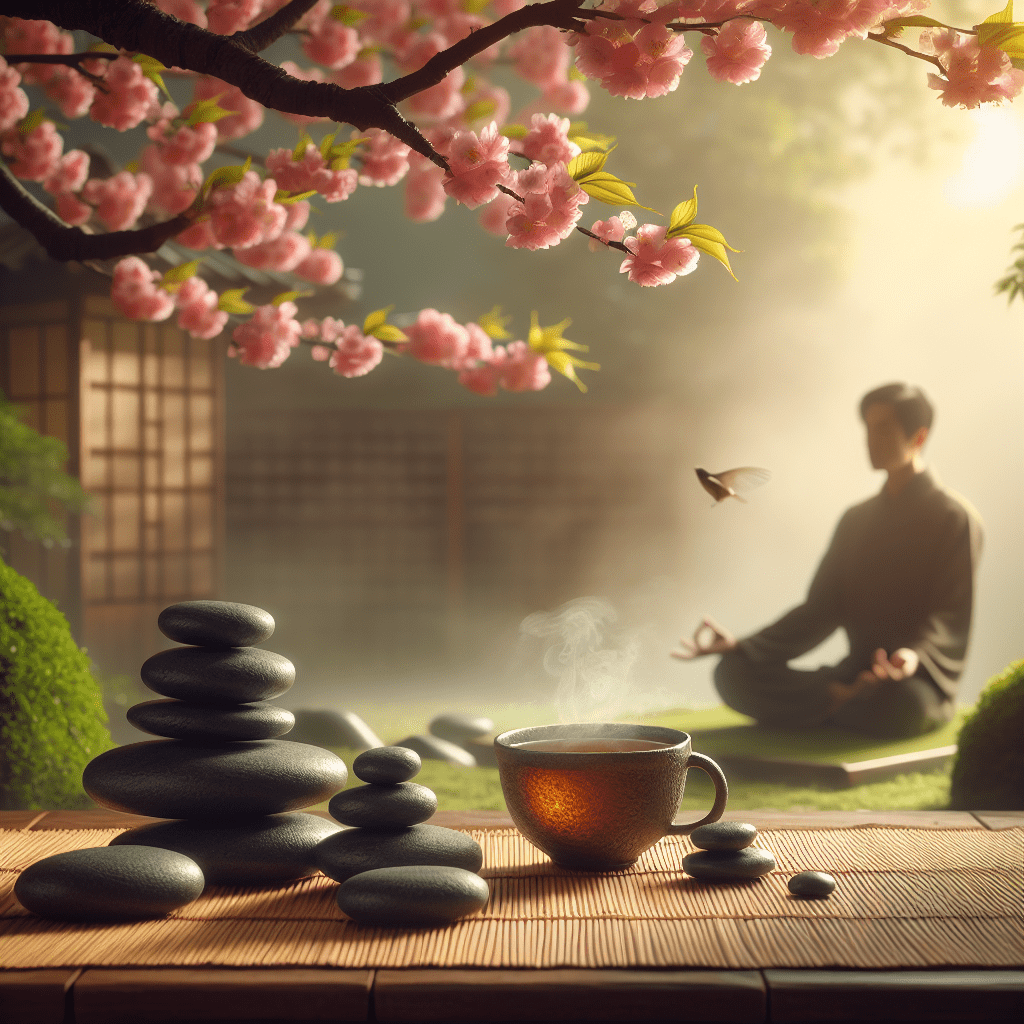Imagine this: Your alarm fails to go off, you spill coffee on your freshly pressed shirt, traffic is unbearable, and your inbox is overflowing with urgent messages before you’ve even reached your desk. In today’s fast-paced world, scenarios like these aren’t the exception—they’re practically the norm. The constant barrage of responsibilities, deadlines, and digital notifications has turned stress into our unwelcome daily companion. (Sound familiar?)
But what if the antidote to this chaos doesn’t require expensive gadgets or complicated techniques? What if two simple practices—sipping tea and mindful breathing—could transform your frazzled day into a more peaceful experience? These accessible tools, rooted in ancient Eastern wisdom, offer powerful stress relief that fits seamlessly into modern life.
The Modern Stress Epidemic
Stress has become so commonplace that many of us have normalized its presence, accepting racing thoughts, tight shoulders, and disrupted sleep as inevitable parts of adulthood. According to recent studies, over 77% of people regularly experience physical symptoms caused by stress, while 73% report psychological symptoms. These numbers reveal not just a personal struggle but a collective challenge.
What makes this epidemic particularly concerning is how chronic stress affects virtually every system in our bodies. From compromised immunity to increased inflammation, disrupted digestion to impaired cognitive function, unchecked stress silently erodes our wellbeing from the inside out.
Eastern healing philosophies have long recognized this mind-body connection, offering holistic approaches to stress relief that Western science is now confirming. These ancient traditions view balance as the foundation of health, teaching that emotional harmony and physical wellbeing are inseparable. Rather than treating symptoms in isolation, Eastern medicine addresses the whole person—body, mind, and spirit.
As Dr. Ming Chen, a specialist in integrative medicine, explains: “Eastern healing traditions don’t separate mental stress from physical health. They understand that emotional calm creates the conditions for bodily healing, while physical balance supports mental peace. It’s a continuous cycle of influence.”
Tea: Nature’s Calming Elixir
One of the simplest yet most effective tools for creating calm comes in a humble cup: tea. Beyond its pleasant taste and warming comfort, tea contains compounds scientifically proven to promote relaxation and reduce anxiety. It’s nature’s remedy in a cup!
Green tea stands out as a particularly powerful stress-fighter, thanks to its abundant L-theanine content. This amino acid works directly with your brain chemistry to induce calm alertness—a state where you remain focused but not frazzled. Research shows that L-theanine increases alpha brain wave activity, similar to what happens during meditation, creating a sense of relaxation without drowsiness.
“L-theanine promotes relaxation by increasing the production of alpha waves in the brain, which are associated with a state of calm alertness,” notes Dr. Sarah Jenkins, neuroscientist and tea researcher. “It’s remarkable how quickly this compound can shift your mental state from stress to calm.”
For those sensitive to caffeine, herbal teas offer excellent alternatives for stress relief:
- Chamomile tea contains apigenin, an antioxidant that binds to specific receptors in your brain that may decrease anxiety and initiate sleep.
- Lavender tea helps reduce cortisol levels (your body’s primary stress hormone) while improving mood and promoting better sleep quality.
- Peppermint tea relaxes tense muscles and has been shown to reduce frustration and anxiety.
- Passionflower tea increases levels of GABA in the brain, a compound that lowers brain activity and promotes relaxation.
Creating a balanced tea routine can be a strategic approach to managing daily stress. Consider starting your day with green tea for alert focus, switching to peppermint in the afternoon for a caffeine-free energy boost, and ending with chamomile or lavender in the evening to signal your body that it’s time to unwind.
Breathing: Your Built-in Relaxation System
While tea provides external support for calm, your most powerful tool for immediate stress relief is literally right under your nose. Mindful breathing—the practice of paying deliberate attention to your breath—activates your parasympathetic nervous system, essentially hitting your body’s “calm button.”
“When we’re stressed, our breathing becomes shallow and rapid, which signals danger to our bodies and perpetuates the stress response,” explains breathing coach Maria Sanchez. “By consciously shifting to slow, deep breathing, we override this cycle and trigger relaxation.”
Simple breathing techniques can create remarkable shifts in your mental state in just minutes. Here are a few particularly effective approaches:
Diaphragmatic Breathing: Also called belly breathing, this technique engages your diaphragm fully:
1. Place one hand on your chest and the other on your belly
2. Breathe in slowly through your nose, feeling your belly expand while your chest remains relatively still
3. Exhale slowly through slightly pursed lips
4. Repeat for 3-5 minutes
Box Breathing: Popular among Navy SEALs for staying calm under pressure:
1. Inhale through your nose for a count of 4
2. Hold your breath for a count of 4
3. Exhale completely through your mouth for a count of 4
4. Hold the empty breath for a count of 4
5. Repeat for at least 5 cycles
4-7-8 Breathing: Particularly helpful for those struggling with racing thoughts:
1. Inhale quietly through your nose for 4 counts
2. Hold your breath for 7 counts
3. Exhale completely through your mouth with a whooshing sound for 8 counts
4. Repeat up to four times
What makes these breathing techniques so powerful for stress relief is their accessibility. Unlike many stress management strategies that require special environments or extended time commitments, mindful breathing can be practiced anywhere—at your desk, in traffic, before a challenging conversation, or while waiting in line. For those seeking additional support, adaptogenic herbs can complement these breathing practices.
The Meditative Tea Moment
While both tea and mindful breathing offer significant benefits individually, their power multiplies when combined. Creating a brief tea meditation—even just 5-10 minutes—can become a transformative daily ritual that anchors you in calm regardless of external chaos. It’s where Eastern wisdom meets modern convenience.
The practice is beautifully simple:
Prepare with intention: Choose your tea mindfully and prepare it with full attention to the process—the sound of water heating, the color changing as it steeps.
Create space: Find a quiet spot where you won’t be disturbed. Silence notifications on your devices.
Center yourself: Before drinking, take three deep breaths, releasing tension with each exhale.
Engage your senses: Notice the warmth of the cup, the aroma of the tea, its color and clarity.
Sip mindfully: Take small sips, experiencing the flavor fully, feeling the warmth travel through your body.
Return to breath: Between sips, bring attention back to your breathing, noticing how your body feels.
This simple practice combines the biochemical benefits of tea with the physiological advantages of mindful breathing, while simultaneously training your brain in present-moment awareness—the cornerstone of effective stress management.
As mindfulness teacher Jon Kabat-Zinn explains, “You can’t stop the waves, but you can learn to surf.” This tea meditation teaches you to “surf” the inevitable waves of daily stress rather than being overwhelmed by them.
The Art of Sensory Awareness
One of the most underappreciated aspects of tea drinking for stress relief is how it naturally encourages sensory engagement. When we fully attend to the experience of tea—its color, aroma, flavor, and temperature—we activate parts of our brain associated with pleasure while temporarily disengaging from worry networks.
This sensory focus is a form of informal mindfulness practice that builds your capacity for present-moment awareness. Research shows that even brief periods of sensory attention can significantly reduce anxiety and improve emotional regulation.
Try this expanded sensory tea practice:
- Visual awareness: Notice the color and clarity of your tea, how light plays through it, how steam rises and dissipates.
- Aroma awareness: Close your eyes and take several small inhalations, noticing different fragrance notes.
- Touch awareness: Feel the smooth surface of your cup, the weight in your hands, the warmth transferring to your skin.
- Taste awareness: Take a small sip and hold it briefly, noticing how the flavor changes and develops on different parts of your tongue.
- Sound awareness: Listen to the quiet sounds of pouring, sipping, and swallowing.
This practice creates a multi-sensory anchor to the present moment, offering your mind a break from the constant forward-projection of worry or backward-dwelling of regret. For many people, this simple reset is enough to break the momentum of a stressful day and restore a sense of calm.
Integrating Ancient Wisdom in Modern Life
The beauty of using tea and mindful breathing for stress relief lies in their accessibility and deep roots in Eastern healing traditions that have withstood the test of time. These practices represent more than just temporary calm—they offer entry points to a more balanced way of living.
In Eastern philosophy, health isn’t merely the absence of disease but the presence of harmony—between body and mind, between person and environment. By incorporating these simple practices into daily life, we begin to embody this holistic approach to wellbeing.
The ancient wisdom behind these techniques aligns perfectly with HerbalsZen’s philosophy of integrating time-tested Eastern healing approaches with modern understanding. Just as EASTCHI AI blends traditional Eastern medical knowledge with cutting-edge technology, combining tea rituals with mindful breathing merges ancient practices with contemporary needs.
This integration honors the understanding that true wellbeing isn’t found in quick fixes but in sustainable practices that address both immediate symptoms and underlying imbalances. By embracing these accessible tools for relaxation, you’re not just managing stress—you’re cultivating resilience, emotional stability, and deeper awareness.
As you navigate life’s inevitable challenges, remember that transformation doesn’t always require dramatic changes. Sometimes, the most profound shifts begin with the simplest actions—breathing consciously, sipping slowly, and returning to the present moment. In these small practices, repeated with intention, lies the power to transform not just your chaotic day, but your entire approach to living.




